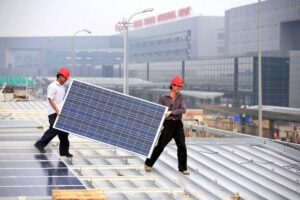AGL Energy chair Patricia McKenzie has warned that quitting coal power in Australia any faster than the gen-tailer is currently proposing will result in the lights going out.
In an op-ed published in the Australian Financial Review on Thursday, McKenzie writes that reaching for the Paris target of 1.5°C will mean an exit from coal too fast to replace it with enough renewables and firming “to keep the lights on.”
“Simply put – we do not consider that the replacement renewable generation, firming and supporting transmission can be built quickly enough and this would put unacceptable pressure on energy security and affordability,” she writes.
The threat of blackouts is something that has become a habit of naysayers, climate deniers and renewable critics – going back to the South Australia system black in 2016, and probably a long time before that.
Former federal treasurer Josh Frydenberg made an art of it, saying in October 2018: “If we were to take coal out of the system … the lights would go out overnight.”
So it is surprising, or maybe disappointing, to hear it coming from McKenzie, who has recently survived a major shakeup in AGL’s leadership ranks.
As former AEMO boss Audrey Zibelman patiently explained it back in 2018, “If we have a transition … from one resource mix to another, certainly we could keep the lights on. But it requires a plan, it requires a plan that could be actionable.”
AEMO has such a plan – the Integrated System Plan – and has no intention of jeopardising NEM energy supply as part of that plan. The federal Albanese government is on board with the plan, as are the state and territory governments of all political leanings.
McKenzie, meanwhile, is under pressure. A campaign led by tech billionaire Mike Cannon-Brooks is pushing for new independent directors to be appointed to AGL’s board, which it says – in its current form – is unfit for purpose.
Galipea Partnership, an entity associated with Grok and Cannon-Brookes with an 11.28% share in AGL, has nominated four candidates for the gentailer’s board to help further speed up its decarbonisation journey.
“Without expanding the size, diversity and skills of the Board, we believe AGL will continue to fall behind the rapidly transforming energy industry, and further destroy shareholder value,” said Cannon-Brookes in a letter to shareholders in late October.
The fate of Grok’s nominees – John Pollaers, Christine Holman, Kerry Schott and Mark Twidell – will be decided by a shareholder vote ahead of the company’s AGM on November 15.
Institutional Shareholder Services (ISS) this week joined others in recommending shareholders vote for all four nominees put forward by Grok, where AGL has indicated that only Twidell has the board’s support.
Grok has also expressed “reservations” about McKenzie in the role of chair “given her involvement in the failed demerger and what has been a chaotic board renewal process.”
In comments this week, the executive director at the Australasian Centre for Corporate Responsibility (ACCR), Brynne O’Brien said it was hard to see how McKenzie could remain in the role, given the proxy advisors’ rejection of her board recommendations.
“Both reports reinforce governance concerns relating to Ms McKenzie, who was elevated into the role after a search that she oversaw failed to put forward any other candidate,” O’Brien said.
“Given one of the key roles of chair is to unite and guide a board, her adversarial approach to the shareholder-nominated directors, some of whom are now likely to be sitting around the board table, looks extremely foolish.”
Grok Ventures declined to comment on the McKenzie op-ed on Thursday when approached by RenewEconomy.
Cannon-Brookes remained silent on the matter, too. Although he did tweet about Volvo’s decision to sell electric cars, only, in Australia by 2026.
Volvo! 👏🏻 for not fucking around or mincing words. And massively beating their own target by 4 years. Kudos 👊🏻 https://t.co/DK4fJlrsfP
— Mike Cannon-Brookes 👨🏼💻🧢🇦🇺 (@mcannonbrookes) November 3, 2022
Enough said.









